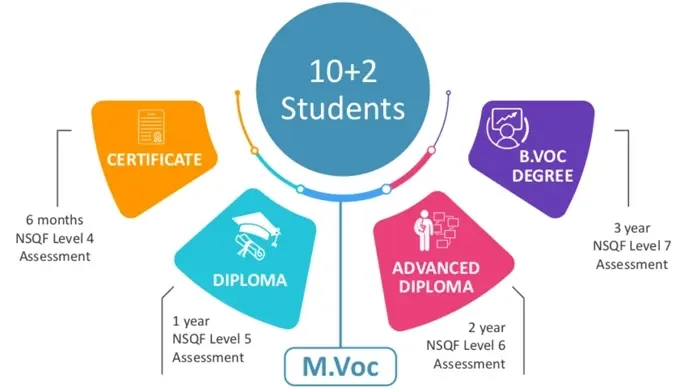Vocational Program
- Home
- Vocational Program




Our Vocational Program Introduced
"Skill‑based education should be the foundation of modern education", with a similar view, the University Grants Commission (UGC), in 2013, introduced the Bachelor of Vocational, commonly known as B.Voc degree program with multiple entry and exit points. B.Voc is a three‑year program that specifically focuses on skill development and make the students industry‑ready. Today, there are more than 100 disciplines/trades for which the B.Voc degree courses are available. Some of the most popular courses include B.Voc in Retail Marketing, Food Processing, Healthcare, Technology, and Renewable Energy.
The General Education Components (GEC) and Skill Education Components (SEC) would be appropriately balanced in each semester/year of the program's curriculum at a predetermined ratio of 40꞉60.

Duration Of The course
The duration of this bachelor course will be 3 years i.e., 6 semesters with the flexibility of exit after completion of 2nd & 4th semesters. On the other hand, the duration of the master's will be of 2 years in 4 semesters.

Overview
As per the reports, India ranks 4th number among the countries facing a shortage of skilled professionals. To address this skill gap, the University Grants Commission (UGC) in 2013, created the UGC-B.Voc/M.VOC scheme as a way to strengthen individuals. To meet the requirement for skilled workers and fill the gap, many well-liked universities offer various online B.Voc/M.Voc courses to support the “Skill India” movement.
B.Voc stands for Bachelor of Vocation, which is a 3-year undergraduate degree program that focuses on providing vocational or skill-based education to students. B.Voc. courses are designed to equip students with industry-specific skills and make them job-ready. The Bachelor of Vocation, or B.Voc has grown to be one of the most sought-after degrees in India since skill-based or vocational education is now more crucial than ever. The purpose of B.Voc is to offer the abilities required for a particular trade. The course differs from conventional academic programs since it emphasizes practical study rather than just theoretical information.
The fact that a candidate has a variety of exit points during the program and ongoing industry exposure is one of the main benefits of choosing a B.Voc course over normal degree courses. The candidate will still receive a diploma after completing the first year or an advanced diploma after completing the second year if they are unable to finish their B.Voc program. The B.Voc course's average tuition ranges from INR 30,000-INR 200,000.
M.Voc which stands for Master of Vocation, is two years long postgraduate degree program that concentrates on specialized work and industry skill sets. Candidates who hold a Master of Vocation degree have the opportunity to develop professional abilities and achieve success in their chosen artistic or technological field. You can work in hospitality, fashion, interior design, travel and tourism, and other industries with a Master's in vocational education. The two most crucial specializations for students to pick are M.Voc in banking and finance and M.Voc in interior design. The M Voc course's average tuition ranges from INR 50,000-INR 500,000.
Several colleges and universities offer the B.Voc/M.Voc in several academic fields. The Vocational courses degree focuses on several different major academic fields, including engineering, medicine, arts & sciences, management, commerce (banking applications), computer science and its applications, food management, and many more.
Why Choose B.Voc/M.Voc Courses
Here are some highlights about B.Voc/M.Voc. courses:
- Skill-oriented Programs :
B.Voc and M.Voc. courses are highly practical and skill-oriented, emphasizing hands-on training and experiential learning. They aim to bridge the gap between academia and industry requirements by providing specialized vocational skills.
- Industry Relevance :
Vocational programs are developed in consultation with industry experts and employers to ensure that the curriculum aligns with current industry demands and trends. This helps students acquire the necessary skills and knowledge that are directly applicable to the workplace.
- Duration and Eligibility :
The duration of a B.Voc. course is typically three years and M.Voc courses two years, similar to a traditional bachelor's and Master’s degree. Eligibility criteria vary across universities, but generally, students who have completed their 10+2 education or equivalent are eligible for admission.
- Specializations :
B.Voc/M.Voc. programs offer a wide range of specializations across different sectors, such as healthcare, hospitality, information technology, tourism, agriculture, manufacturing, logistics, retail, media, and more. Depending on their interests and career objectives, students might pick a specialization.
- Industry Partnerships :
Many vocational programs institute have collaborations with industry partners, which can lead to opportunities for internships, industry projects, and job placements. These partnerships help students gain practical experience and increase their employability.
- Job Opportunities :
Vocational courses graduates are equipped with specialized skills and knowledge, making them suitable for various job roles in their chosen industry. They can work in both public and private sectors, start their own businesses, or pursue higher education or research in related fields.
- Recognition :
B.Voc/M.Voc courses are recognized by the University Grants Commission (UGC) in India and are considered equivalent to other traditional bachelor's degree programs. This ensures that B.Voc and M.Voc graduates receive the same recognition and opportunities as graduates from other disciplines.
- Career Advancement :
Vocational programs focus on developing practical skills, which can give graduates a competitive advantage in the job market. They can enter the workforce directly after completing their degree or choose to pursue higher education or specialized certifications to further enhance their career prospects.
Most Preferred Specialization for M.Voc/ B.Voc courses
| B.Voc in Radiology and Medical Imaging Technology | M.Voc in Computer Applications |
| B.Voc in Optometry Technology | B.Voc in Computer Applications |
| B.Voc in Operation Theater Technology | B.Voc in Yoga and Naturopathy |
| B.Voc in Dialysis Technology | B.Voc in Library Science |
| B.Voc in Cardiac Care Technology | B.Voc in Hotel Management |
| B.Voc in Hospital Sterilization Technology | B.Voc in Medical Lab Technology |
| B.Voc in Patient Care Management | M.Voc in Hospital Management |
| B.Voc in Physiotherapy | B.Voc in Library Science |
Scope and Latest Salary Trend for B.Voc
B.Voc graduates candidates can choose to work in industries like automotive, electronics, healthcare, industrial safety, manufacturing of industrial tools, pharmaceuticals, travel and tourism, renewable energy, printing and packaging technology, etc. after completing a BVoc Degree/Diploma/Advance Diploma. However, the salary varies on the different factors and specialization, the average salary of B.Voc graduate skilled professionals ranges between 3-5 LPA.
Scope and Salary Trend for M.Voc Graduates
Due to the extensive nature of the programme, there are rewarding job prospects after earning a Master of Vocation. It is among the top options for students who have a B.Voc. Students have the option to pursue a master's degree or carry on with their current course of study. specialization. In addition to Ph.D. programmes, they are qualified to enroll in MBA programmes. Professionals with an M.Voc degree often earn between 3-5 LPA on average.
Eligibility for B.Voc courses
Candidates with a 10+2 or equivalent in any stream may pursue a BVoc course. They must be eager to acquire new skills through hands-on experience, on-the-job training, and project work. They must aspire to work in a variety of fields, including publishing, printing, tourism, construction, entertainment, IT, marketing, agriculture, and the automotive industry. They will get Core Skills and professional knowledge that will enable them to enter the market and meet customer requests.
Eligibility for M.Voc Courses
Candidates must hold a bachelor's degree, often known as a 10+2+3 (Bachelor of Vocation), from an accredited university in order to be eligible for M.Voc admission.
Level of B.Voc Certificates
Online B.Voc courses awards are divided into 3 parts diploma/advanced diploma and B.Voc degree.
If the candidate pursues the course for one year, then he/she is liable to be awarded a diploma in that particular course.
If the candidate pursues the course for two years, then he/she is liable to be awarded an advanced diploma in that particular course.
If the candidate pursues the course for three years, then he/she is liable to have a B.Voc Degree in that particular course.
Level of M.Voc Certificates
Online M.voc courses awards are divided into 3 parts diploma and M.Voc degree.
If the candidate pursues the course for Six months, then he/she is liable to be awarded a certificate in that particular course.
If the candidate pursues the course for one year, then he/she is liable to be awarded a diploma in that particular course.
If the candidate pursues the course for three years, then he/she is liable to have an M.Voc Degree in that particular course.
The field of paramedics is expanding. Numerous opportunities exist, including those in paramedicine, Health Administration, Physiotherapy, Nursing, Pharmaceutical Chemistry, Critical Care Management, Medical Imaging Technology, Molecular Diagnostic Technology, Patient Care Management, Medical Lab Technology, Nutrition and Health Care Science etc. Afer a doctor's prescription, the holders of vocational degrees serve as the foundation of a hospital. They would be essential members of the healthcare team and would be crucial in gathering the data required to provide a sick or injured patient with the best care possible. Around the world, yoga has also become more and more popular. The necessary training is offered to those who are interested in pursuing future careers in the vocational programs of Yoga Science and Naturopathy & Yoga.
The Internet is currently used to transact business globally. Every firm needs to have a strong online presence in order to market, sell, and advertise its goods and services to users all over the world in today's digital environment. Web Technologies and Multimedia, Data and Web Analytics, Information Technology, The Internet of Things, Artificial Intelligence and Data Analytics, Digital Media and Animation, E‑Commerce and Digital Marketing, Software Development, Systems Administration, and Cybercrime are among the vocational programs offered by the School of Vocational Studies.
A professional in the field of Food Technology may work in the restaurant industry, hospitals, catering businesses, food wholesalers, and food manufacturing facilities. Jobs in Hotel Management require a variety of abilities, including serving food and beverages, running the front desk, doing sales and marketing, and accounting, among others. One of the nation's most noticeable and significant infrastructure components is its hotel industry, which is also related to Tourism and Hospitality Management.
The course in Journalism and Mass Communication emphasizes editing, writing, photography, etc. Graduates of journalism and mass communication can find employment in industries like Advertising, Journalism, Radio, Writing, and Television. Fine Arts graduates have a variety of professional options, including Graphic Design, Flash Animation, Teaching, Art Officer, and Archaeology.
